Demolition Contractors Wordsley
Top 10 Demolition Services in Wordsley
Get multiple Structure Demolition quotes for your project today! Compare profiles, reviews, accreditations, portfolio, etc... and choose the best service.
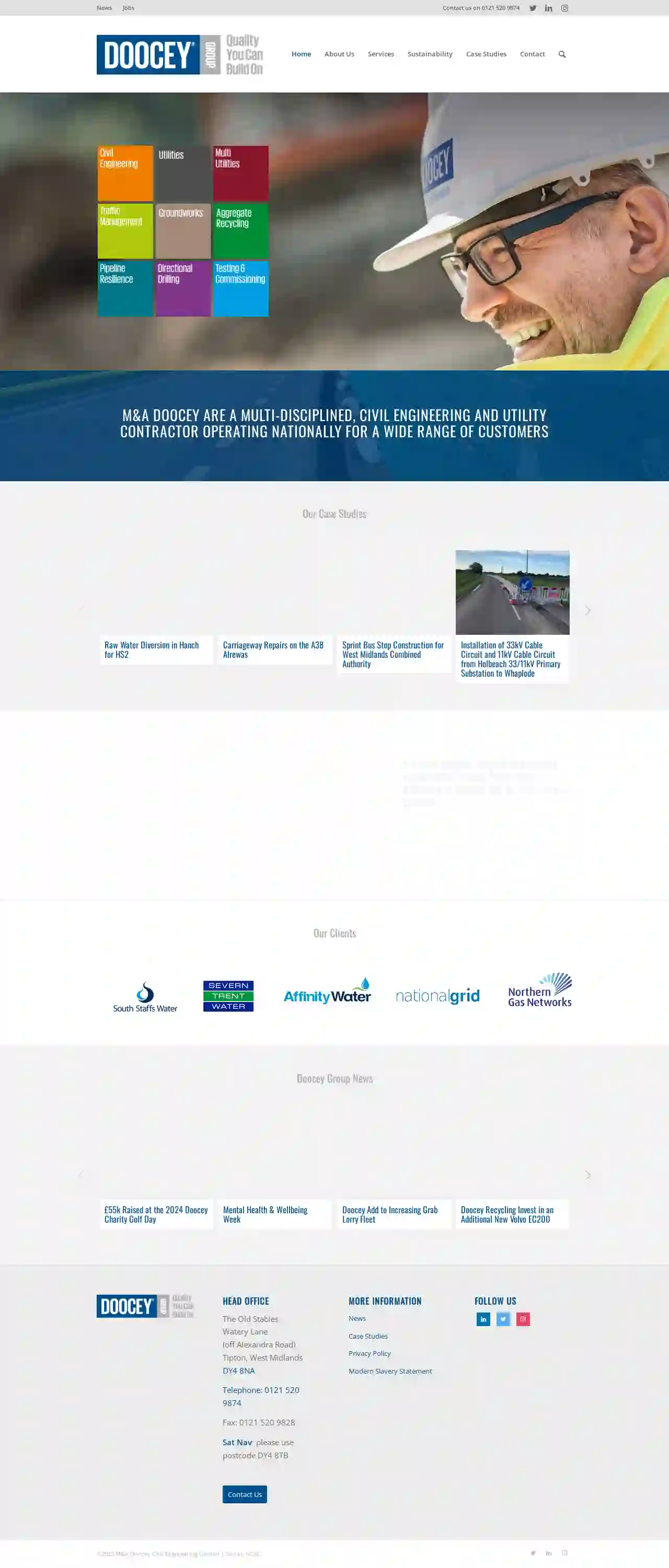
Doocey Group
3.460 reviewsTipton, GBM&A Doocey are a multi-disciplined, civil engineering and utility contractor operating nationally for a wide range of customers We have over 30 years experience with Gas, Water and Electric Utilities, and are innovators in creating CBEM3 for cost effective backfill. We work on live pipelines to ensure continuous supply and use Directional Drilling for environmentally sensitive areas or transport infrastructures. We also offer safe and compliant pressure testing for water networks. Core expertise in both Groundworks and Civil Engineering We are a multi-disciplined, Traffic Management operating nationwide 24/7/365. We are a leading cross-country pipeline contractor for gas, water and electrical.
- Services
- Why Us?
- Testimonials
- Gallery
Get Quote
Beegle's Excavating & Land Management
52 reviewsBedford, PA, GBBeegle's Excavating & Contracting: Your Trusted Excavation Partner in Bedford, PA Beegle's Excavating & Contracting is a reputable excavation contractor serving Bedford, PA and the surrounding areas. We're dedicated to providing top-notch services, including land clearing, underbrush removal, gravel paving, land excavating, and land grading. Our team is committed to delivering exceptional results, ensuring your project is completed efficiently and to your satisfaction. We understand that building a new home or office building is an exciting endeavor. That's why we're here to help you prepare your property for construction. Our experienced team will handle all the necessary excavation work, leaving you with a clean slate ready for your dream project. At Beegle's Excavating & Contracting, we prioritize customer satisfaction. Our owner brings a lifetime of experience to the table, and we're equipped with the latest tools and equipment to tackle any job. We're dedicated to exceeding your expectations and ensuring your complete satisfaction. Contact us today for a free estimate and let us help you clear the way for your next construction project in Bedford, PA.
- Services
- Why Us?
- Gallery
Get Quote
Glenn T Harris Ltd
59 reviewsUnit B2, Brook Street Business Centre, Unit B2 Brook Street Business Centre Brook Street Tipton West Midlands, Tipton, DY4 9DD, GBGlenn T Harris Limited Glenn T Harris Limited is an independent family run business established in 2005. We are renowned for providing high quality customer service, building and construction solutions across the West Midlands. Our quality of service is the back bone to the success of the company.
- Services
- Why Us?
- Gallery
Get Quote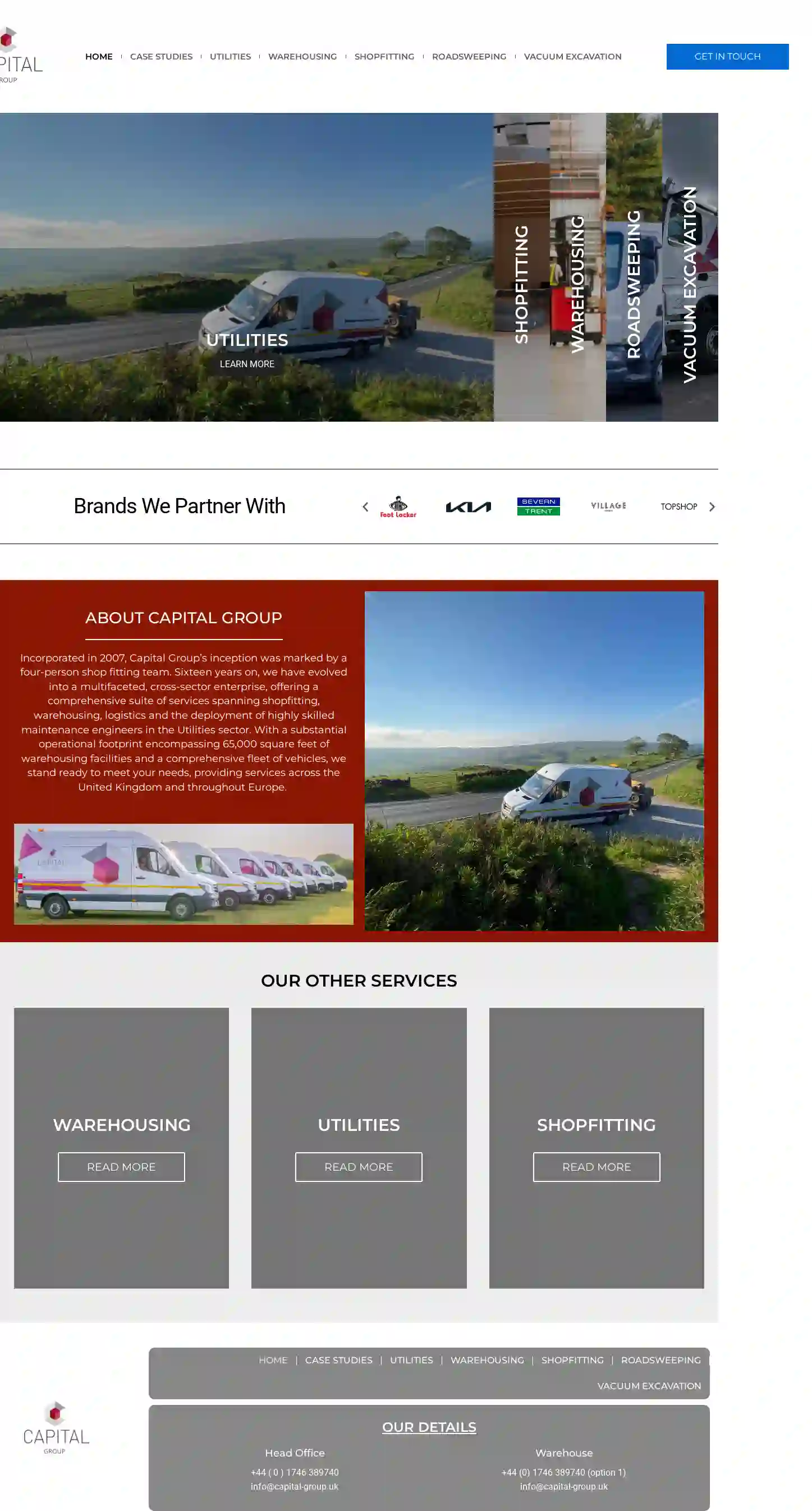
Vacuum Excavator Hire - Capital Group
Unit 65 & 68, Pensnett Trading Estate, Kingswinford, DY6 7GA, GBABOUT CAPITAL GROUP Incorporated in 2007, Capital Group began as a four-person shop fitting team. Sixteen years later, we have evolved into a multifaceted, cross-sector enterprise, offering a comprehensive suite of services spanning shopfitting, warehousing, logistics and the deployment of highly skilled maintenance engineers in the Utilities sector. With a substantial operational footprint encompassing 65,000 square feet of warehousing facilities and a comprehensive fleet of vehicles, we stand ready to meet your needs, providing services across the United Kingdom and throughout Europe. JOHN LEWIS We have had the privilege of collaborating with John Lewis since 2012. We take pride in our significant involvement in the successful delivery of the Leeds’ store, a project spanning five floors, where we were responsible for the installation of a £1 million worth of store fixtures within a 14-week timeframe.
- Services
- Why Us?
- Gallery
Get Quote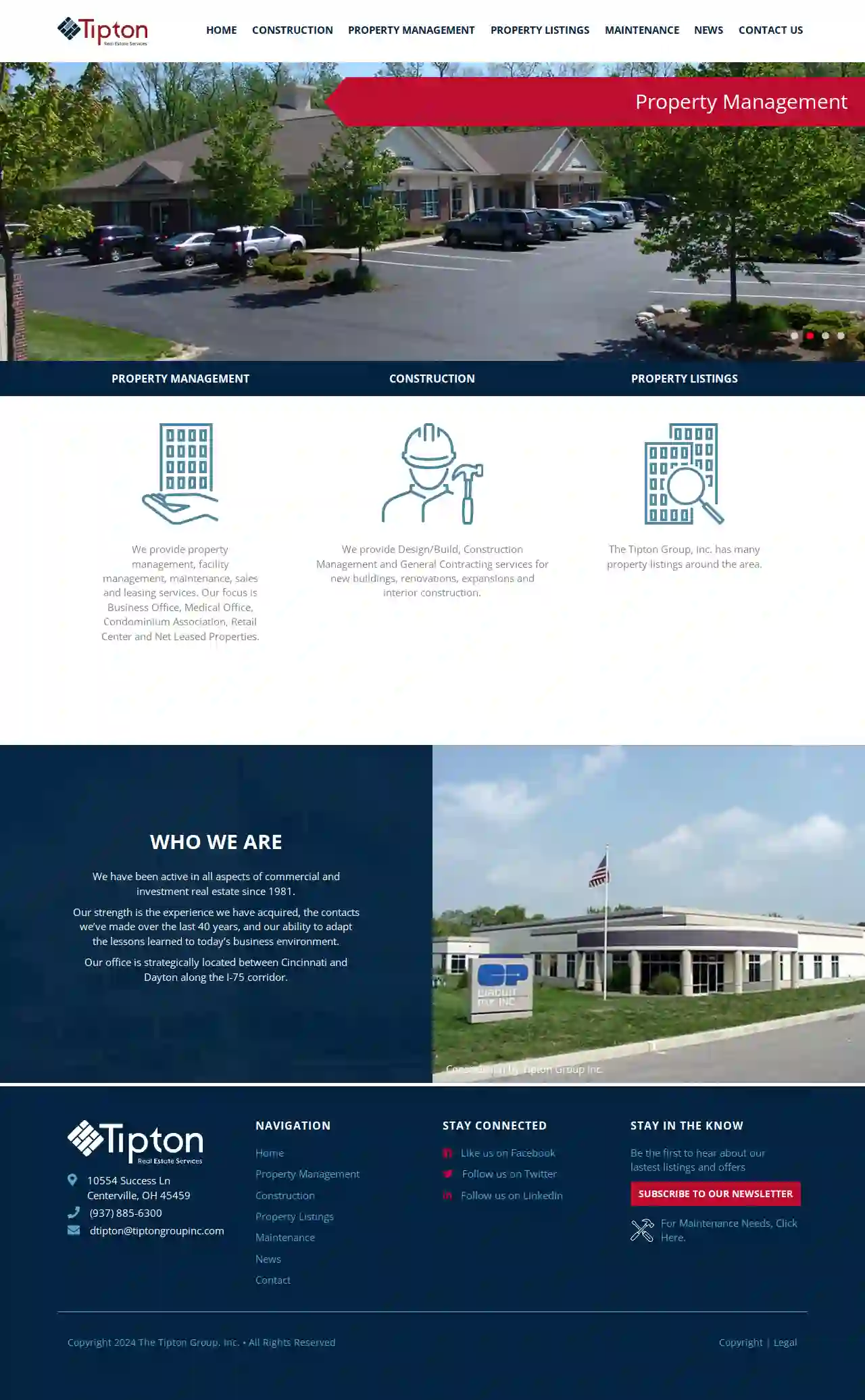
Tipton Construction, Inc.
10554 Success Ln, Centerville, 45459, GBAbout Tipton Group Inc. Tipton Group Inc. has been a leading force in commercial and investment real estate since 1981. Our extensive experience, strong network of contacts cultivated over four decades, and adaptability to today's business landscape set us apart. We are strategically located along the I-75 corridor, bridging the gap between Cincinnati and Dayton. Our commitment to excellence is evident in the comprehensive range of services we offer, encompassing property management, facility management, maintenance, sales, and leasing. We specialize in serving a diverse clientele, including businesses, medical offices, condominium associations, retail centers, and net-leased properties. In the realm of construction, we excel in Design/Build, Construction Management, and General Contracting. Our expertise extends to new building projects, renovations, expansions, and interior construction, ensuring that every project is executed with precision and care. Tipton Group Inc. boasts a portfolio of diverse property listings throughout the region. We are dedicated to providing our clients with exceptional service and tailored solutions that meet their unique needs.
- Services
- Why Us?
- Gallery
Get Quote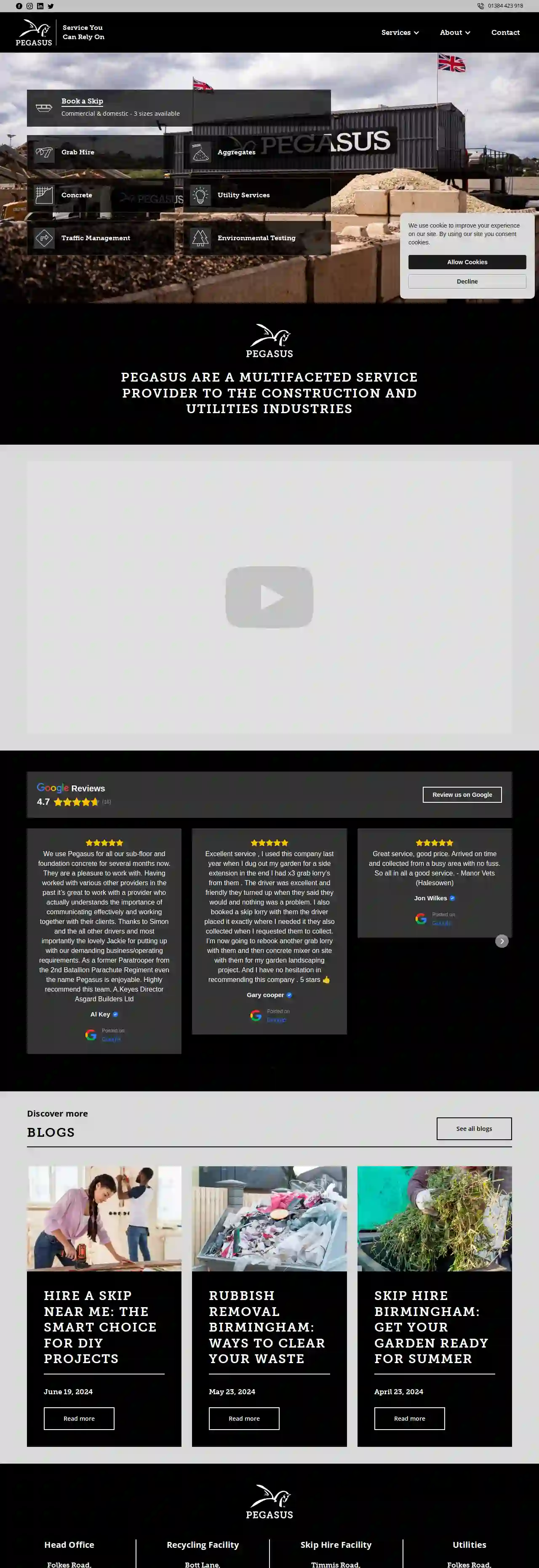
We Are Pegasus
4.716 reviewsFolkes Road, Halesowen, Stourbridge, DY9 8RG, GBWelcome to The Pegasus Group The Pegasus Group was established in 2010. Through hard work and investment, the company has achieved its current status as one of the most reliable construction and utility service companies in the Midlands, with a steadily increasing turnover, now at circa £40m. Our extensive waste management and recycling business fully supports all our utility activities, supplying and delivering quality aggregates and concrete across the region to our fast-growing and varied client base. Pegasus Utilities, with a turnover in 2021/22 of circa £11m, specialises in end-to-end utility sector delivery for power, gas, and telecoms clients. Our extensive commercial fleet supports this delivery from excavation to final reinstatement. All arisings/waste from our utility works are processed via our state-of-the-art wash plant and recycled to provide washed aggregates and concrete for reuse on our client projects. Currently, only 1% of the material processed in our facility goes to landfill. We are Pegasus Pegasus holds full NERS Accreditation, as well as ISO 9001, ISO 14001, and ISO 45001 certifications. We also have Construction Line Gold and CHAS Advanced Accreditation, along with the FORS Fleet Operators Registration Scheme Silver Standard. Pegasus Utilities Ltd is a highly adaptable business that can swiftly respond to client requests without the corporate red tape often encountered in the utility industry. This agility meets clients' expectations and regulatory requirements promptly and professionally. The Pegasus Group also operates Skip Hire, Traffic Management, and Environmental Testing businesses, all of which support our Recycling and Utilities divisions as needed.
- Services
- Why Us?
- Accreditations
- Gallery
Get Quote
Trice & Allen
4.68 reviewsYard 2, Lye Valley Industrial Estate, Lye, Stourbridge, DY9 8HX, GBWelcome to Trice & Allen Welcome to Trice and Allen Grab Hire, your trusted partner for efficient and reliable grab hire services based in Stourbridge. With over 20 years in business, we have established ourselves as a leading name in the grab hire industry. Our Mission At Trice and Allen, our mission is to provide top-notch grab hire solutions. We specialise in providing professional and affordable services for a wide variety of customers and needs including muck away, rubbish away and all other types of non-hazardous waste as well as a fully licensed transfer station, along with a tipping facility and now, aggregate delivery. We cater to a wide range of construction, landscaping, and waste management needs. Our Commitment to Quality Chris Trice and Craig Allen have proved themselves to be the leading provider of grab hire and aggregate delivery in the Stourbridge area. Covering primarily Lye, Dudley, Kingswinford, Brierley Hill, Blackheath, Halesowen and Kidderminster but also the surrounding areas, Trice and Allen pride themselves in offering quality service. Craig says, “Whilst there are other suppliers in the area, we have found that our customer service is what makes our customers return to us again and again. Whether it’s for construction use, or our home customers’ gardens, the quality of service will always be the same. At Trice and Allen all staff are well acquainted with the company’s ethos, and the cheerful and efficient drivers ensure that delivery is smooth. Even in some of the more difficult places to deliver to, there is always an attitude that at Trice and Allen we will work with you to get the job done. Environmental Responsibility This fully licensed business meets all environmental and waste standards and tries to recycle as much waste as possible, reducing the volume entering landfill.
- Services
- Why Us?
- Gallery
Get Quote- RB
RB Diggs
Tipton, GBUnfortunately, without access to the actual website content, I cannot provide a detailed description. The provided URL is a Facebook profile page, which doesn't offer the kind of information needed for a comprehensive business description. To generate a detailed description, I would need access to the business's official website.
- Services
- Why Us?
- Gallery
Get Quote 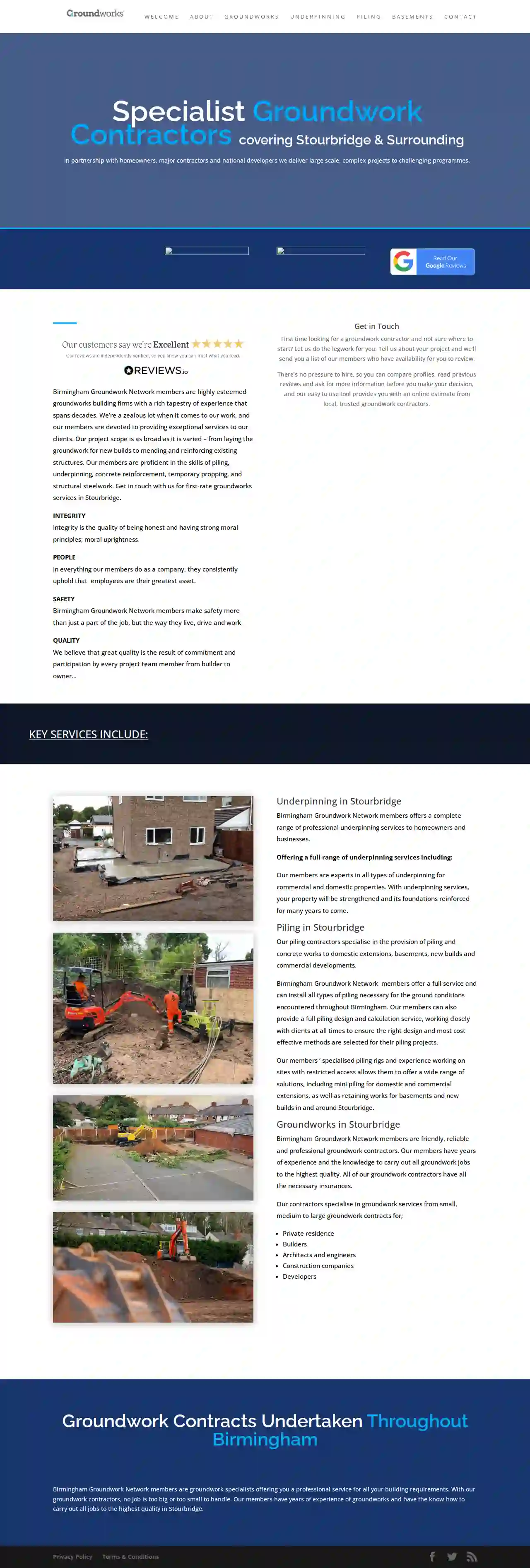
Evenfield Groundworks Limited
52 reviewsStourbridge, GBBirmingham Groundwork Network: Your Trusted Groundwork Specialists in Stourbridge At Birmingham Groundwork Network, we are a collective of highly esteemed groundworks building firms with a rich tapestry of experience spanning decades. We are passionate about our work and dedicated to providing exceptional services to our clients. Our project scope is as broad as it is varied, encompassing everything from laying the groundwork for new builds to mending and reinforcing existing structures. Our members are proficient in a wide range of skills, including piling, underpinning, concrete reinforcement, temporary propping, and structural steelwork. We are committed to delivering large-scale, complex projects to challenging programmes, working in partnership with homeowners, major contractors, and national developers. We believe in the importance of integrity, safety, and quality in everything we do. Our members consistently uphold the principle that employees are their greatest asset, and we prioritize safety as a fundamental aspect of our work. We believe that great quality is the result of commitment and participation from every project team member, from builder to owner. If you're looking for a reliable and professional groundwork contractor in Stourbridge, look no further than Birmingham Groundwork Network. Contact us today to discuss your project and receive a list of our members who have availability to review.
- Services
- Why Us?
- Gallery
Get Quote
Whitney Paving
520 reviews109 Ivy Rd, Tipton, West Midlands, DY4 9QL, GBStunning. Quality. Workmanship. We Create Beautiful Spaces... Put us to Work on Yours! Commercial Contracting? We do that Too! MADE IN BRITAIN We are proud of our Heritage, and support British industry, we only use quality materials manufactured here in the UK QUALITY GUARANTEED All of our work is carried out with acute attention to detail, add to this the Quality Products we use and you are Guaranteed to have a top notch Service FREE DESIGN & QUOTE SERVICE One of our designers will visit you to discuss what you’d like for your home or business and show you the materials and styles available. This service is completely free. Welcome to Whitney Paving and Landscaping! We Offer a Great Range of Services That Our Customers Love: We are based in, and cover the whole of the West Midlands, with over 20 years experience in providing both Domestic and Commercial customers with our wide range of Services, including Paving, Driveways and Landscaping, our customers know they are in safe hands. Please browse our website and if you would like a free quote or have any questions don’t hesitate to Contact Us
- Services
- Why Us?
- Testimonials
- Gallery
Get Quote
Over 13,059+ Excavation Contractors registered
Our excavation providers operate in Wordsley and surroundings!
ExcavationHQ has curated and vetted the Best Excavation Contractors in Wordsley. Find the most reliable pro today.
Frequently Asked Questions About Demolition Contractors
- Permits and Regulations: Obtain all necessary demolition permits and comply with local building codes and environmental regulations.
- Contracts: Have a clear and comprehensive contract with the demolition contractor outlining the scope of work, payment terms, and liabilities.
- Environmental Laws: Comply with environmental laws regarding hazardous material removal, waste disposal, and pollution control.
- Neighboring Property Rights: Respect neighboring property rights and take measures to prevent damage or disruption to adjacent properties.
- Worker Safety: Adhere to worker safety regulations and provide a safe working environment for demolition crews.
- Site Security: Secure the demolition site with fencing and warning signs to prevent unauthorized access.
- Personal Protective Equipment (PPE): Workers should wear appropriate PPE, including hard hats, safety glasses, gloves, and steel-toe boots.
- Hazardous Material Removal: Properly identify and remove asbestos, lead paint, or other hazardous materials before demolition begins.
- Utility Disconnections: Disconnect all utilities, such as electricity, gas, and water, before demolition.
- Controlled Demolition Techniques: Employ controlled demolition methods to minimize risks and ensure the structure comes down safely.
- Dust Control: Implement dust suppression measures, such as water spraying or misting, to reduce airborne particles and protect air quality.
- Emergency Planning: Have an emergency plan in place, including communication protocols and evacuation procedures, in case of unforeseen events.
- 'Can I see proof of your licensing and insurance?' Verify their credentials and coverage.
- 'What experience do you have with projects like mine?' Ensure they have relevant expertise.
- 'Can you provide references from past clients?' Check their reputation and customer satisfaction.
- 'What are your safety protocols?' Prioritize contractors who emphasize safety.
- 'How will you handle hazardous materials?' Ensure they have proper procedures for asbestos or lead abatement.
- 'What is your timeline for completing the project?' Understand the project duration.
- 'How will you manage noise, dust, and debris?' Discuss mitigation measures for minimizing disruption.
- 'What are your payment terms?' Clarify payment schedules and any required deposits.
What are the legal considerations for demolition projects?
What are the safety precautions for demolition?
What questions should I ask a demolition contractor before hiring them?
How do I find demolition contractors near me?
What are the legal considerations for demolition projects?
- Permits and Regulations: Obtain all necessary demolition permits and comply with local building codes and environmental regulations.
- Contracts: Have a clear and comprehensive contract with the demolition contractor outlining the scope of work, payment terms, and liabilities.
- Environmental Laws: Comply with environmental laws regarding hazardous material removal, waste disposal, and pollution control.
- Neighboring Property Rights: Respect neighboring property rights and take measures to prevent damage or disruption to adjacent properties.
- Worker Safety: Adhere to worker safety regulations and provide a safe working environment for demolition crews.
What are the safety precautions for demolition?
- Site Security: Secure the demolition site with fencing and warning signs to prevent unauthorized access.
- Personal Protective Equipment (PPE): Workers should wear appropriate PPE, including hard hats, safety glasses, gloves, and steel-toe boots.
- Hazardous Material Removal: Properly identify and remove asbestos, lead paint, or other hazardous materials before demolition begins.
- Utility Disconnections: Disconnect all utilities, such as electricity, gas, and water, before demolition.
- Controlled Demolition Techniques: Employ controlled demolition methods to minimize risks and ensure the structure comes down safely.
- Dust Control: Implement dust suppression measures, such as water spraying or misting, to reduce airborne particles and protect air quality.
- Emergency Planning: Have an emergency plan in place, including communication protocols and evacuation procedures, in case of unforeseen events.
What questions should I ask a demolition contractor before hiring them?
- 'Can I see proof of your licensing and insurance?' Verify their credentials and coverage.
- 'What experience do you have with projects like mine?' Ensure they have relevant expertise.
- 'Can you provide references from past clients?' Check their reputation and customer satisfaction.
- 'What are your safety protocols?' Prioritize contractors who emphasize safety.
- 'How will you handle hazardous materials?' Ensure they have proper procedures for asbestos or lead abatement.
- 'What is your timeline for completing the project?' Understand the project duration.
- 'How will you manage noise, dust, and debris?' Discuss mitigation measures for minimizing disruption.
- 'What are your payment terms?' Clarify payment schedules and any required deposits.